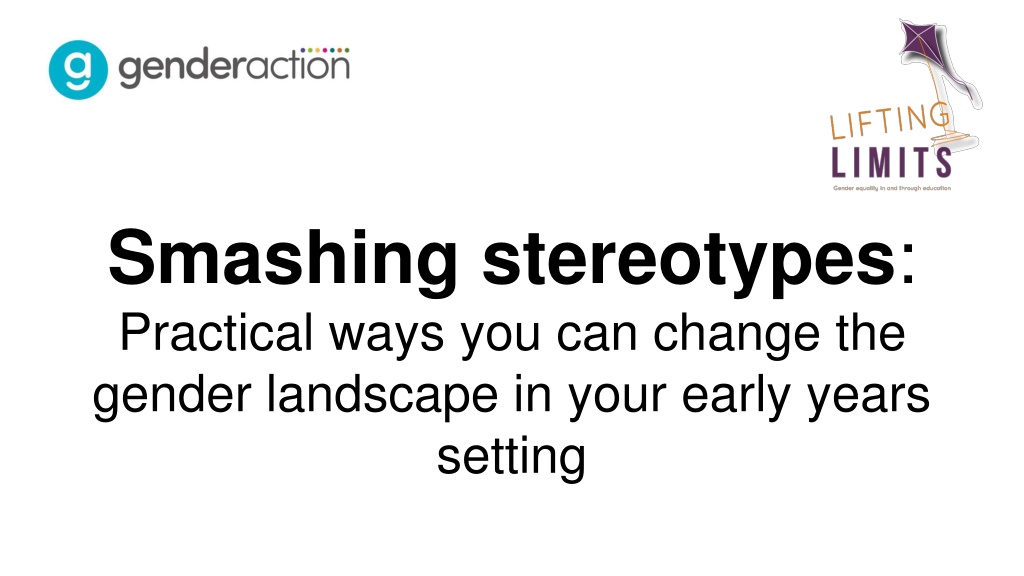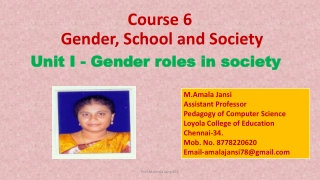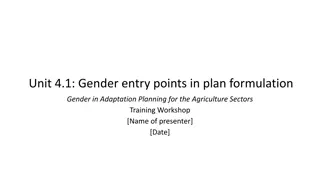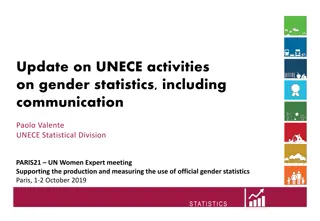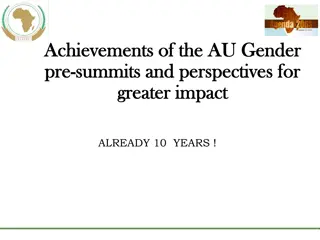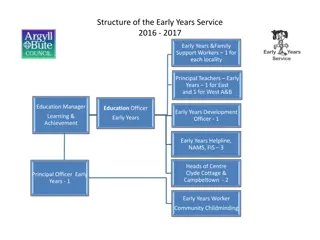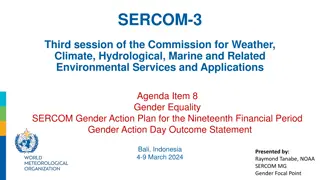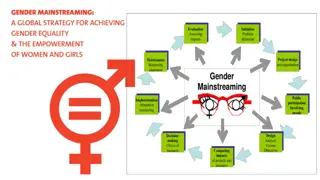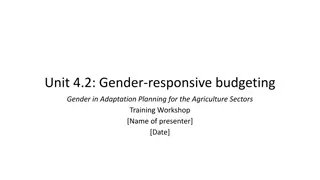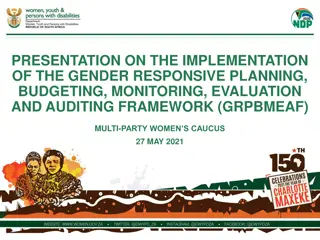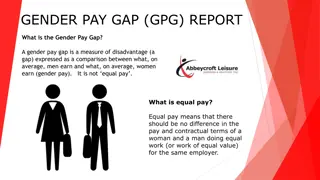Transforming Gender Norms in Early Years Settings
Discover practical strategies to challenge gender stereotypes in early years education, influencing a more inclusive future workforce. Explore the importance of whole-setting change, awareness, self-reflection, training, and consistent messaging. Follow the story of a nurse challenging societal norms and take a quiz to test your understanding.
- Gender diversity
- Early childhood education
- Stereotype challenges
- Whole-setting change
- Inclusive environment
Download Presentation

Please find below an Image/Link to download the presentation.
The content on the website is provided AS IS for your information and personal use only. It may not be sold, licensed, or shared on other websites without obtaining consent from the author. Download presentation by click this link. If you encounter any issues during the download, it is possible that the publisher has removed the file from their server.
E N D
Presentation Transcript
Smashing stereotypes: Practical ways you can change the gender landscape in your early years setting
Objectives Learn some top tips from two pioneering programmes which are changing how schools and nurseries think about gender - and sowing the seeds for a more gender-diverse future early years workforce.
Why challenge gender stereotypes in the early years? Stereotypes affect children and staff Fixing stereotypes now can help fix the gender gap later Gender stereotypes negatively affect boys and girls
Why it needs to be whole-setting change? Evidence-based Consistency of messaging Priorities You don t want it to feel like it s this isolated thing that you do. It needs to be embedded in everything that you do. (Gender Champion, Lifting Limits pilot school) In general, because the staff have been informed on it and aware of it, the children are going to experience more of it all the time and we have displays about it, we have lessons and it s everywhere in the school now, which is good. I think that that is what you need to make it something that is just normalised. (Teaching support staff, Lifting Limits pilot school)
Whole-setting change Awareness and self-reflection Audit Training Discussion and challenge
Story - prepare for a quiz A builder, leaning out of the van, shouts nice legs to a nurse passing by. The same nurse arrives at work and casually mentions this to a senior doctor. The doctor said, I d never say that . The doctor has two grown up children who are 22 and 30. They get on very well. One is a Sergeant in the Army; the other is training to be a beauty therapist. The doctor divorced last year and is currently dating someone else.
True False Don t know The builder was driving a van The van was travelling quicker than the nurse There was at least one man in the van Not every man mentioned in the passage would shout nice legs The doctor and his wife are no longer married The doctor has a new girlfriend The doctor s son is in the army The doctor s youngest child is training to be a beauty therapist At some point in the text a man spoke to a woman A woman was shouted at
True False Don t know The builder was driving a van The van was travelling quicker than the nurse There was at least one man in the van Not every man mentioned in the passage would shout nice legs The doctor and his wife are no longer married The doctor has a new girlfriend The doctor s son is in the army The doctor s youngest child is training to be a beauty therapist At some point in the text a man spoke to a woman A woman was shouted at
Story - prepare for a quiz A builder, leaning out of the van, shouts nice legs to a nurse passing by. The same nurse arrives at work and casually mentions this to a senior doctor. The doctor said, I d never say that . The doctor has two grown up children who are 22 and 30. They get on very well. One is a Sergeant in the Army; the other is training to be a beauty therapist. The doctor divorced last year and is currently dating someone else.
Looking at examples of change Looking at language Challenging stereotypes at play
What are the messages that children may pick up from statements like these? (from Stonewall report) That s not a very ladylike thing to do I need a strong boy to help me! She s a proper girly girl Boys will be boys! He s a real boy, needs to play outside a lot to let off steam Man up! Come on, big boys don t cry
Discussion and challenge That s a boys game Pink is a girl s colour Why do you think that? Who says so? Who gets to decide that?
Gender Action: Goals so far Staff to consider their own biases and check how they talk to children to see if they need to adapt any of their language to be more gender inclusive and less stereotypical. Auditing provision to ensure unimpeded use of all play areas by all children. Open up possible career choices to children through the use of positive role models, display, available literature and other innovative ways Engaging with parents about the negative impacts that gender stereotyping has on young children. Encouraging a more inclusive curriculum that engages all children irrespective of gender. Creating an environment where staff are fully informed about gender issues, use appropriate language, and challenge stereotypes. Creating a learning environment where there is no gender bias and barriers are removed.
Lifting Limits: Findings from evaluation Change can happen! One year of challenging stereotypes through a whole school approach... Staff - increased awareness, reflection, changing attitudes, confidence in challenging Pupils - see a more diverse range of roles and possibilities for women/girls and men/boys, confidence in challenging stereotypes and gender norms, improved relationships between girls and boys Early Years children - 3x as many said football was for everyone Parents - increased understanding and confidence discussing with children Schools - collective awareness, gender lens
Actually theres been none of that stuff that there was at the beginning. Oh youre a boy you cant wear a dress. They re sort of accepting it more. So I think that is huge progress And actually we ve made a real concerted effort to make sure that when they re playing like the boys don t dominate the bikes or the girls don t dominate the writing table actually. (Early Years Teacher, Lifting Limits pilot school) And when they re playing they do play a lot together. I think that s because we ve done a lot of work of developing friendships and developing interests and collaborative play. So you ll find boys and girls all sat at the writing table drawing together and boys and girls on the climbing frame. And there s not a division. I ve had other reception classes where the girls were always in the home corner and the boys always in the sand pit. And the boys never touch the writing table because that s what the girls do. (Early Years Teacher, Lifting Limits pilot school)
How to get involved Lifting Limits: find out more at www.liftinglimits.org.uk Contact us at info@limitinglimits.org.uk Follow us at @LiftingLimitsUK Gender Action: register with us at www.genderaction.co.uk/register-now Contact us at info@genderaction.co.uk Follow us at @_Gender_Action Personal Practice Workshop on Tuesday 29 October at the Institute of Physics
